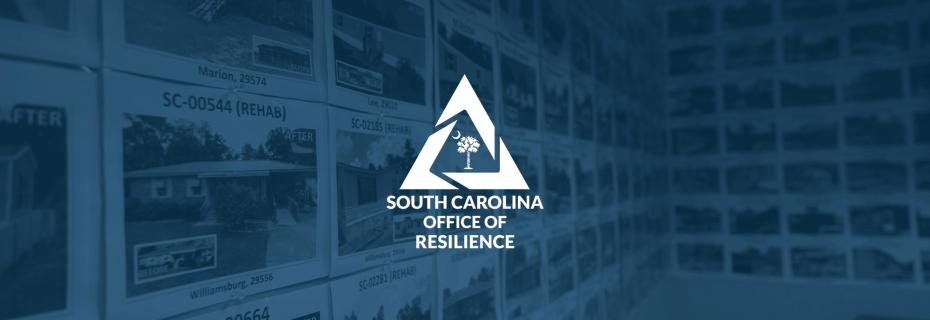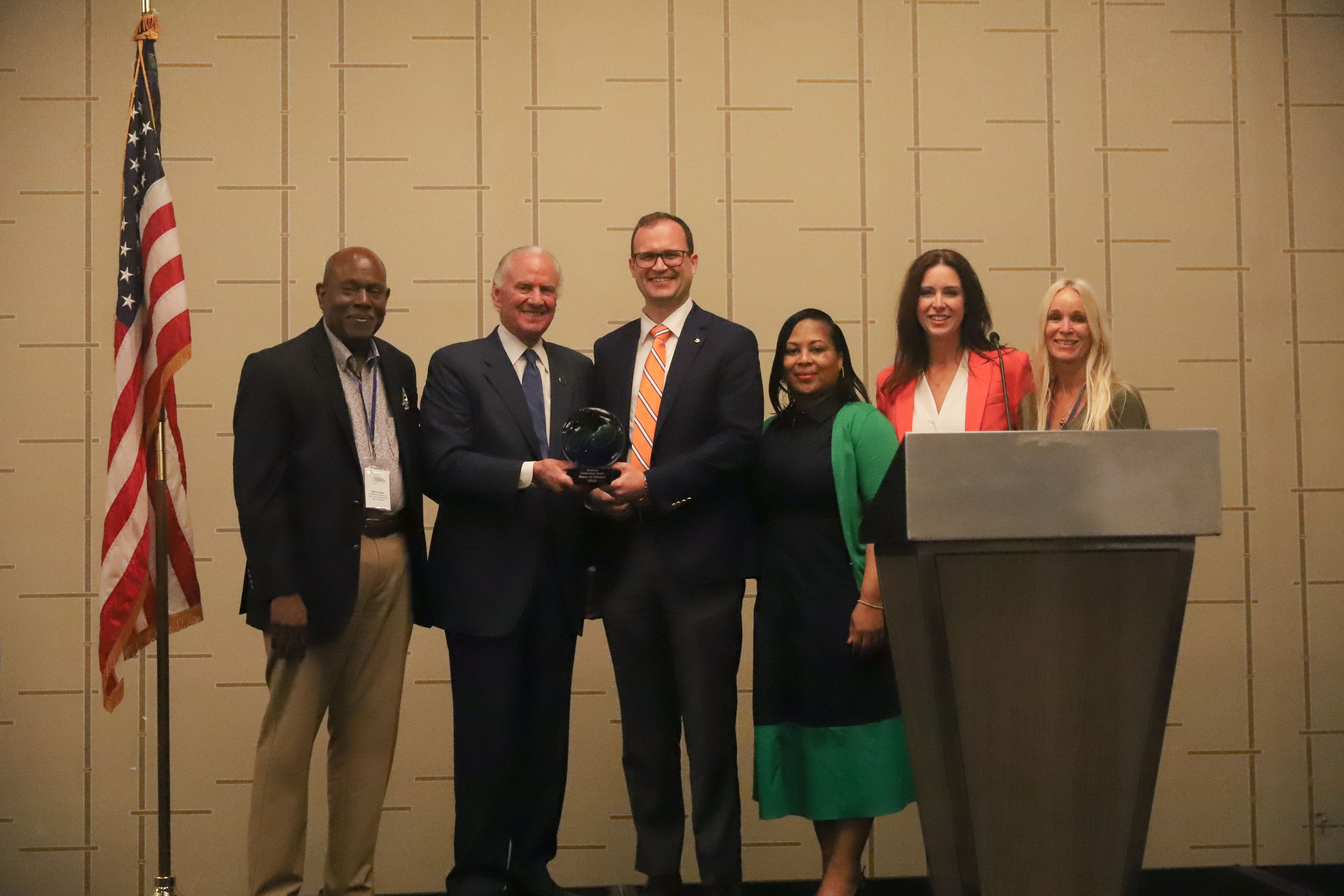About Us
 The Official Web Site of the State of South Carolina
The Official Web Site of the State of South Carolina
Please visit SCEMD website for winter weather updates.
Hurricane Helene overview information here | SCOR Disaster Case Management Services: 1-803-898-2511
Applications open September 1, 2025 - February 13, 2026 for Hurricane Helene CDBG-DR Mitigation Set-Aside Program here.
Applications open January 1, 2026 - March 31, 2026 for HUD CDBG-MIT Voluntary Buyouts here.

Greenville, SC – The Resilient Community Award was presented to the Town of Cheraw on the final day of the April 7-9 SC Resilience Conference. The award celebrates local governments that demonstrate commitment to implementing resilience efforts that enhance “the ability of communities, economies, and ecosystems to anticipate, absorb, recover, and thrive when presented with environmental change and natural hazards.” This resilience definition was established in the SC Office of Resilience’s (SCOR) 2023 Strategic Statewide Resilience and Risk Reduction Plan and is the foundation of statewide resilience planning and coordination.

The Town of Cheraw has a proven track record of prioritizing resilience-building efforts. A study of the Town’s stormwater system played a critical role in identifying causes of flooding and formulating potential solutions. This, in turn, enabled Cheraw officials to apply for grant funding from SCOR’s Community Development Block Grant – Mitigation (CDBG-MIT) program to enhance Cheraw’s stormwater system and conduct voluntary buyouts.
“The Town, in partnership with SCOR, facilitated the buyout of 9 homes in flood hazard areas along Huckleberry Creek,” explains Robert Wolfe, Town Manager. “This area also happened to be a EPA Superfund Site, so not only did we remove flood issues, but we were able to relocate families and individuals out dangerous environmental conditions. This site will now be permanent green space, and the Town intends to utilize much of the space for tree planting to prevent stream bank erosion throughout the area.”
Cheraw officials continue to improve the Town’s resilience by actively identifying and pursuing further opportunities to secure funding for critical projects. They have been working with the Forestry Commission and the Green Infrastructure Center to conduct a tree canopy sturdy to identify where additional trees can be planted, with one goal of this effort being floodwater absorption, along with reducing the impact of heat on the community. They also participate in the National Main Street Program, and are working to revitalize existing structures and integrate green infrastructure in their community development and infrastructure projects.
In addition to the Town of Cheraw, the City of Columbia and Beaufort County received nominations this year. Columbia is currently implementing multiple projects focused on efficient energy consumption and pollution reduction. As the first and only Leadership in Energy and Environmental Design (LEED) certified city in South Carolina, Columbia has demonstrated measurable strides towards increasing its resilience.
“Currently, we are working with the Central Midlands Council of Governments on the EPA’s Climate Pollution Reduction Grant, a program to create and implement a regional action plan,” remarks Mary Pat Baldauf, Sustainability Facilitator at the City of Columbia Public Works Department. “As part of that plan, we are working to install a regional solar farm at the City’s wastewater treatment plant and implement smart surfaces projects to help manage the sun and the rain. The City has a goal to power all City owned and operated investments and infrastructures with the generation of an additional 75 MW of energy from non-combustion based renewable sources by 2036.”
Beaufort County has worked with numerous partners to make significant strides in assessing hazards and vulnerabilities, land conservation, long-term strategic regional planning and coordination. Environmental Long Range Planner Juliana Smith notes that the County’s 2022 Green Space Penney Sales Tax program “has worked with partners, like the Open Land Trust, to protect more than 4,900 acres of land in and out of Beaufort County, supporting protections for the Port Royal Sound, the ACE Basin, and our communities that depend on the ecosystem services they provide.” Smith further elaborates on the partnerships the County has formed since adopting a 2024 Long-Term Resilience Strategy: “Working with partners at the Shi Institute at Furman University, the County was able to kick-start a Regional Resilience Working Group by hosting a day-long Resilience Accelerator that brought together regional resilience actors to align region-wide resilience priorities and better leverage data sharing, budgeting, funding, and project implementation though southern coastal counties. This initiative has led to the creation of a Regional Resilience Working Group, who’s work will realize the goals identified at the accelerator.”
The South Carolina Resilience Conference is an annual gathering of leaders, innovators, and advocates from diverse fields hosted by South Carolina SC7, a partnership between two South Carolina based non-profit organizations, Global Eco Adventures and the South Carolina National Heritage Corridor. Through close collaboration, conference attendees work to inspire change, catalyze action, and chart a course towards a more resilient South Carolina.
###
About SCOR: The South Carolina Office of Resilience (SCOR) is committed to enhancing the state's ability to anticipate, absorb, recover, and thrive when presented with environmental changes and natural hazards by planning and coordinating statewide resilience, long-term disaster recovery, and hazard mitigation. In addition to serving 3,459 homes in our Disaster Recovery Program, SCOR has 81 active flood mitigation projects, including voluntary buyouts, stormwater infrastructure, and plans and studies, across the State. SCOR continues to implement and maintain the Strategic Statewide Resilience and Risk Reduction Plan, which provides a framework to guide investment in projects, programs, and policies to protect the people and property of South Carolina from the damage and destruction of extreme weather events.
South Carolina SC7: SC 7 is a partnership between 2 South Carolina based non-profits: Global Eco Adventures and the South Carolina National Heritage Corridor. The mission of SC7 is to get people in the outdoors so they gain an appreciation for the outdoors, and therefore begin to actively do their part to protect the outdoors.